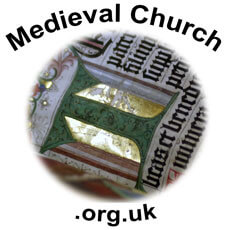Theology on the Web helps over 2.5 million people every year to find high quality theological resources that will help to equip them to serve God and to know Him better (2 Timothy 2:15). Like other websites that provide free services, it is dependent on donations to enable it to grow and develop and only 0.004% of visitors currently do so. If you would like to support this site, please use one of the options to the right of this message.
Book Description
- Title:
- Anselm's Theory of the Atonement. The Bampton lectures 1908
- Author:
- George Cadwalader Foley [1851-1935]
- Publication Year:
- 1901
- Location:
- London
- Publisher:
- Longmans, Green and Co.
- Pages:
- 327
- Subjects:
- Anselm of Canterbury, Soteriology, Doctrine of Salvation, Medieval Church History
- Copyright Holder:
- Public Domain
![George Cadwalader Foley [1851-1935], Anselm's Theory of the Atonement. The Bampton lectures 1908](images/books3/anselms-theory-of-the-atonement_foley.jpg)
Contents
- The John Bohlen Lectureship
- Preface
- Introduction
- The Patristic Teaching
- General Characteristics
- The Apostolic Fathers
- The Post-Apostolic Fathers
- Justin Martyr
- Irenaeus
- Clement of Alexandria
- Origen
- Nicene and Post-Nicene Fathers
- Eusebius of Caesarea
- Athanasius
- Later Greek Fathers
- Gregory of Nyssa
- Gregory of Nazianzus
- Chrysostom
- Cyril of Alexandria
- The Latin Fathers
- Tertullian
- Cyprian
- Augustin
- The Anselmic Theory
- Patristic and Medeival Antecedents
- Antecedents afferting the substance of the theory
- A racial Characteristic
- Eccesiastical ideas and discipline
- German criminal law
- Feudalism
- Antecedents affecting the form of the theory
- "Cur Deus Homo?"
- Preliminary to the argument
- The argument
- Some valuable features of the theory
- Defects of the theory
Criticism in Detail
- the idea of Honour
- The idea of Satisfaction
- The forensic form of the theory
- The latent Dualism
- The Nestorian element
- Satisfaction considered as Substitution
- The purpose of the Incarnation
- The purely objective character of the theory
- A pernicious effect of the theory
- Anselm's Contemporaries and Successors
- His adherents
- Hugh of St Victor
- Alexander of Hales
- Bonadventura
- Thomas Aquinas
- His opponents
- Abelard
- Bernard
- Peter Lombard
- Duns Scotus
- Anselm's Relation to reformation Theology
- Basis of Protestant Soteriology
- Antithesis of Protestant Soteriology
- Passive satisfaction
- Penal satisfaction
- Endurance equivilent to eternal death
- Imputation
- The modern development and reaction
- Estimate of the Value of the Treatise
![George Cadwalader Foley [1851-1935], Anselm's Theory of the Atonement. The Bampton lectures 1908](images/books3/anselms-theory-of-the-atonement_foley.jpg)








